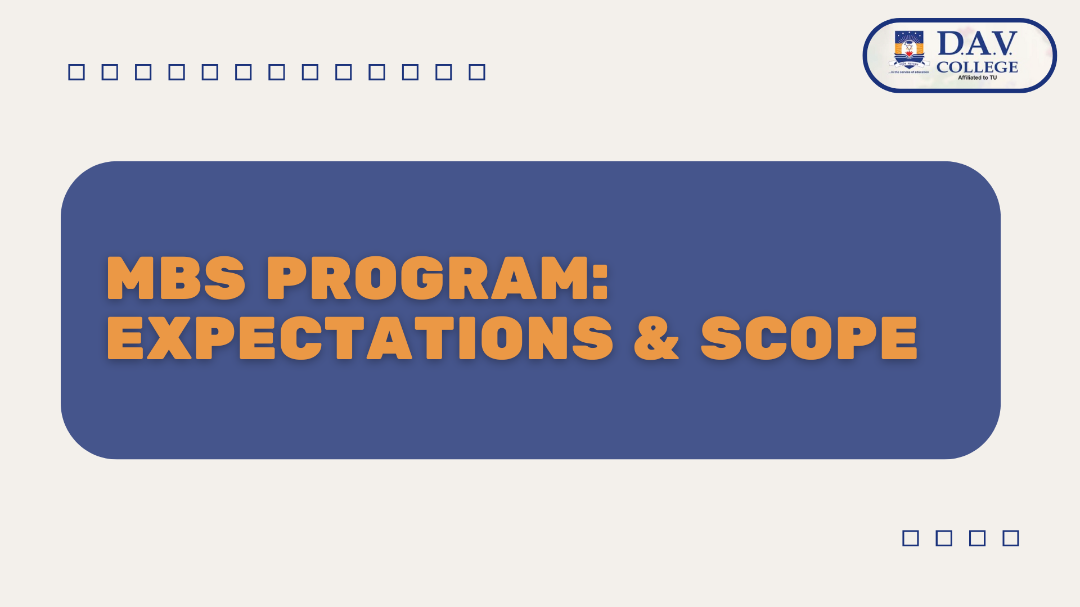What to Expect from an MBS Program in Nepal: Curriculum, Skills & Scope
Published on 2025-07-23

If you're considering a Master of Business Studies (MBS) in Nepal, you're likely weighing one key question: What exactly will I learn—and how will it help my career? This guide provides a detailed breakdown of the MBS program in Nepal, including its core curriculum, the real-world skills you’ll gain, and the professional opportunities it can open for you.
Understanding the MBS Program in Nepal
The MBS program in Nepal, primarily offered under Tribhuvan University (TU), is a two-year, four-semester postgraduate degree designed to develop strong analytical and managerial skills for leadership in business and public administration.
Unlike MBA programs that emphasize practical exposure and case-based learning, MBS leans more towards an academic approach, while still equipping students with strategic thinking and research capabilities. This makes it particularly suitable for those interested in both professional roles and future educational or research pursuits.
A Closer Look at the MBS Curriculum
The MBS curriculum in Nepal is structured to balance theoretical foundations with applied business skills. Here’s what you’ll typically study over the four semesters:
First Semester – Laying the Foundation
- MGT 513: Managerial CommunicationFocuses on professional writing, presentations, and communication strategies.
- MGT 515: Managerial EconomicsIntroduces micro and macroeconomic tools for business decision-making.
- MGT 519: Organizational BehaviorExplores employee behavior, motivation, and team dynamics.
- MGT 514: Statistical MethodsEquips students with quantitative tools for data-driven decisions.
- MGT 518: Business EnvironmentExamines how political, legal, technological, and cultural environments impact business operations.
Second Semester – Building Analytical Capability
- MGT 516: Human Resource Management
- MGT 520: Marketing Management
- MGT 517: Financial Management
- MGT 521: Production and Operations Management
- MGT 522: Management Accounting
This semester dives into core management disciplines and prepares students for advanced courses and specialization tracks.
Third Semester – Strategy & Research
- MGT 523: Business Research MethodologyTrains students to design research projects and use tools like SPSS or Excel.
- MGT 525: International BusinessHelps students understand globalization, trade policies, and cross-border management.
- MGT 524: Strategic ManagementDevelops long-term planning and business strategy formulation skills.
- Specialization Course I & IIStudents choose a concentration—Finance, Marketing, Accountancy, or Management Science—and start diving deep.
Fourth Semester – Integration & Application
- MGT 526: Entrepreneurship: Teaches how to develop business plans, secure funding, and manage startups.
- Specialization Course III & IV: Students complete their chosen track, adding expertise and domain-specific knowledge.
- MGT 527: Internship/Thesis/Project Work: This is the culmination of the program—either through hands-on industry experience or a detailed research thesis.
Specialization Areas in the MBS Curriculum
Your choice of specialization will shape your career trajectory. Here are the major options:
- Finance – Investment analysis, risk management, financial institutions.
- Marketing – Consumer behavior, brand management, digital marketing.
- Accountancy – Advanced accounting, auditing, financial reporting.
- Management Science – Quantitative modeling, project management, operations research.
Each path not only dives deeper into specific business functions but also opens targeted career opportunities in both Nepal and abroad.
Skills You’ll Gain from the MBS Program
Beyond classroom learning, the MBS curriculum in Nepal builds practical, transferable skills:
- Analytical Thinking – Statistical and financial analysis capabilities.
- Strategic Decision-Making – Evaluating competitive environments and making high-impact choices.
- Research Proficiency – Designing, executing, and analyzing business research.
- Leadership and Teamwork – Managing people, delegating tasks, and driving performance.
- Entrepreneurial Mindset – Identifying market opportunities and launching ventures.
- Ethical Reasoning – Understanding corporate governance and responsible business practices.
These competencies are highly valued in sectors ranging from banking and insurance to consulting, FMCG, and government services.
Career Scope After MBS in Nepal
An MBS graduate in Nepal can pursue roles such as:
- Business Analyst
- Financial Controller
- HR Manager
- Marketing Executive or Brand Manager
- Operations Supervisor
- Entrepreneur or Startup Founder
- Lecturer or Academic Researcher
If you're academically inclined, the MBS also serves as a stepping-stone toward a PhD or MPhil in business-related disciplines.
Why the MBS Program Stands Out
- Affordability – Compared to MBA programs, the MBS is budget-friendly, making it accessible for more students.
- Academic Depth – It balances practical training with academic research, preparing students for diverse paths.
- Recognition – MBS from Tribhuvan University is widely respected by both government and private sectors.
Final Thoughts
The MBA program in Nepal's curriculum is a robust and thoughtfully designed framework for future business professionals. Whether your goal is to climb the corporate ladder, start your own company, or pursue academia, the MBA equips you with the knowledge and capabilities to achieve it. Its combination of core business fundamentals, specialized focus, and a capstone experience ensures you graduate as a well-rounded and future-ready professional.
Frequently Asked Questions
1. What is the eligibility for joining an MBS program in Nepal?
Applicants must have completed a bachelor's degree in business (such as BBS, BBA) or an equivalent recognized by TU. Some colleges may require entrance exams, such as CMAT.
2. Is the MBS program equivalent to an MBA?
While both are master’s degrees in business, the MBS is more academically focused and theoretical, whereas an MBA is more case-driven and industry-focused. However, both offer strong employment potential depending on your career goals.
3. Can I pursue an MBS degree while working full-time?
Yes. Many colleges, such as DAV, offer morning or evening classes, allowing working professionals to balance their work and studies.